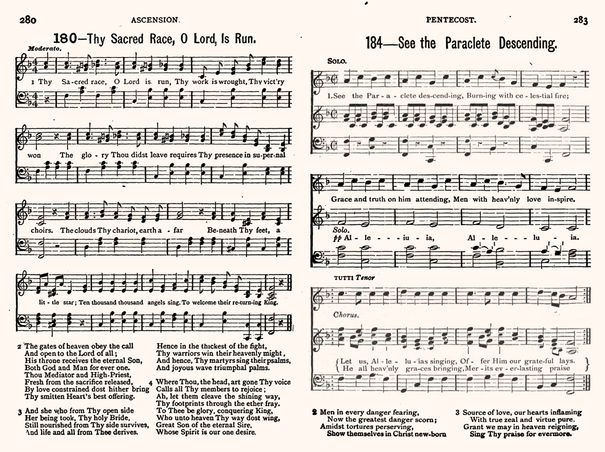 ERY SOON, the St. Jean de Brébeuf Hymnal will be sent to print, and this collection is truly unique. Our international committee has examined hundreds of hymnals, taking only that which is excellent—and discarding the rest. Magnificent new texts and melodies have also been commissioned.
ERY SOON, the St. Jean de Brébeuf Hymnal will be sent to print, and this collection is truly unique. Our international committee has examined hundreds of hymnals, taking only that which is excellent—and discarding the rest. Magnificent new texts and melodies have also been commissioned.
It goes without saying we won’t select any of the “goofy” stuff found in too many American churches since Vatican II. For example, we will not be using the following text—printed by the progressive Collegeville Abbey 1—which has an IMPRIMATUR from 1966:
“And as we float along through outer space,
Past galaxies aglow in dark’s embrace,
Toward other worlds where brothers may await,
Do care for us now in our weightless state.”

The “outer space hymn” reminds me a verse by Marty Haugen (a non-Catholic):
Not in the dark of buildings confining,
Not in some heaven, light-years away,
But here in this place, the new light is shining,
Now is the Kingdom, now is the day.
Those heretical lyrics were included in major Catholic hymnals for decades, such as the Worship Hymnal from GIA Publications. (And here’s a photograph to prove it.)
Our settings, however, are taken from the authentic liturgy, such as the Breviary hymns. (More on this later.) Many “traditional” hymnals consist almost exclusively of protestant hymnody, and we have avoided this pitfall in a marvelous way—after tremendous consultation and research.

BUT CREATING A GOOD HYMNAL involves much more than simply digging through old Catholic hymnals. Indeed, many of these hymnals contained melodies of a extremely low quality. Consider the type of music used in a Roman Catholic hymnal from 1878 (Hymnal and Vesperal for the Seasons and Principal Festivals of the Ecclesiastical Year):

Here are some pages from a 1906 hymnal that was quite popular in America:

American bishops saw nothing wrong with this type of music:
* * PDF • Catholic bishops who supported this 1906 Hymnal
Those who serve on the committee to produce the Brébeuf hymnal do not feel melodies such as those possess the dignity (or artistic excellence) required for use at Holy Mass.

NOTES FROM THIS ARTICLE:
1 Whereas some orders have reformed since the 1960s, becoming more orthodox, the monks at Collegeville have gone the opposite direction. Not long ago, a seminary professor at Saint John’s Abbey in Collegeville publicly described the traditional practice of preventing Eucharistic particles from falling on the floor as a “fetish”—yet he was not censured, and still continues to teach.
